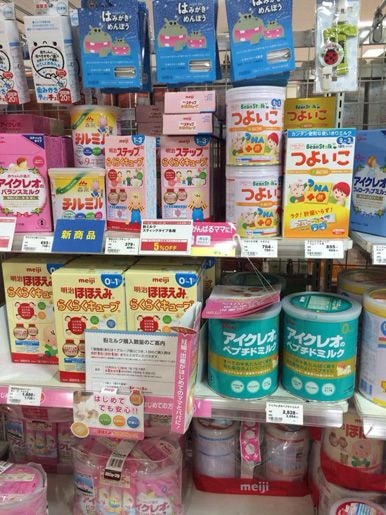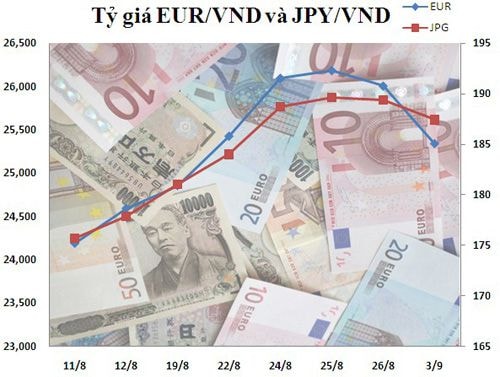Hand-carried goods from Japan and EU are expensive according to exchange rates
The price of the Japanese milk carton that Ms. Tram still buys for her child has increased from 540,000 VND to 580,000 VND due to the "skyrocketing value of the yen," according to the store owner.
Ms. Tram (Van Quan, Ha Dong) often buys Japanese domestic milk and diapers for her daughter who is less than one year old. She also often buys some German mother and baby products. Recently, the prices of all items have increased sharply by 7-10%. "Seeing the price increase, I went to some other hand-carried shops to ask but they were just as expensive, even at milk and cosmetic brands from England, Germany... Roughly calculating, the cost for my daughter each month can increase by 5-10%", she said.
 |
Japanese hand-carried goods importers continuously warn of price increases due to the appreciation of the yen. Photo: Mai Anh.
Recently, many sources of imported hand-carried goods and international orders from Europe and Japan - two of the most trusted hand-carried markets for women - have also continuously complained on online shopping sites about the skyrocketing exchange rate. Ms. Ngoc, the owner of an online shop specializing in importing Japanese hand-carried goods in Thai Ha (Hanoi) lamented: "Since the exchange rate started to increase, I have continuously reminded mothers to order early and buy early, but at that time most of them still thought that the shops were making excuses to stimulate demand and did not believe it. Since the end of August, the exchange rate has increased so much that we no longer try to keep the price, and had to give mothers a new price."
In early September, a series of stores announced new prices for imported milk and cosmetics, with the sole reason being the high exchange rate. A box of Japanese milk, which used to cost 510,000-540,000 VND, now costs 570,000-600,000 VND. Similarly, clothes and shoes imported to Vietnam from England, Spain, Japan, etc. are also more expensive than before.
In the past two weeks, not only the US dollar, the exchange rate of the euro and Japanese yen against the VND has also established a new price level, increasing by 5-9% compared to the time before China strongly devalued the yuan (August 11) - the event that started causing turmoil in the international currency market.
 |
Despite a slight decrease in early September, the selling price of the euro and Japanese yen still increased by 5-7% compared to mid-August and established a new price level.
On August 11, in the bank, more than 24,000 VND was exchanged for one euro (EUR) and the price of one Japanese yen (JPY) was 176 VND. By August 25, the EUR exceeded 26,000 VND and the Japanese yen also increased to 190 VND. In the free market, foreign exchange points said that there was a time when the euro increased several times a day.
By early September, the EUR and JPY prices had slightly decreased by a few dong compared to August 25, but were still about 6-7% higher than half a month earlier. Talking to VnExpress, an officer of the foreign exchange management department of a bank said that the Japanese yen had actually been on the rise since early August, while the euro only really increased sharply after developments from China. According to him, China's devaluation of the yuan caused considerable turmoil in a number of economies. In August alone, the euro and the Japanese yen both increased by nearly 3% against the USD. Meanwhile, August was also the time when the USD/VND exchange rate fluctuated strongly when Vietnam's domestic currency was devalued by 3% (including the exchange rate adjustment and margin).
According to Gia dinh.net
